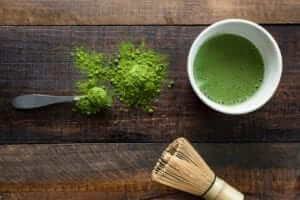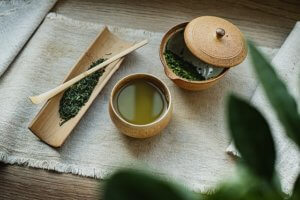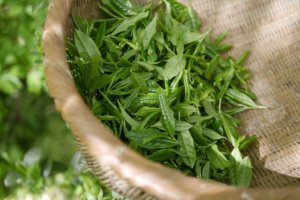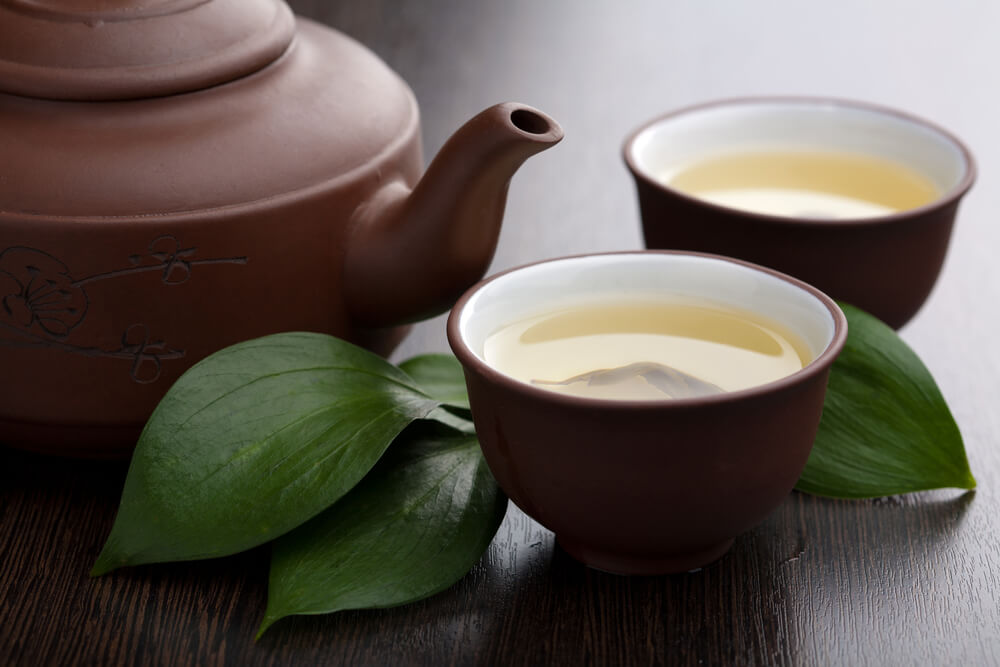Green tea is often referred to as the healthiest beverage on the planet. It’s even been called the “ultimate” anti-aging beverage— one that has been consumed for thousands of years.
Not every superfood (or super-beverage in this case) can live up to all the hype surrounding it, but green tea has no trouble in doing so. Research studies consistently confirm the well-established benefits of green tea and even continue to find new ones.
To give you a glimpse of everything this super-tea can do, here’s more about the history and benefits of green tea for skin, health, and longevity.
What is Green Tea? An Ageless, Revered Beverage
Tea can essentially be divided into four categories: black, green, white, and oolong. All four types of tea come from the Camellia sinensis plant and differ only by when they are picked and how they are processed post-harvest.
(Note: Herbal teas are not considered “true” teas because they don’t contain actual tea leaves.)
White tea is the least processed of the four followed closely by green tea. Black and oolong teas usually go through more processing, including fermentation and different types of heating methods.
Green tea leaves retain their green color because they are withered then quickly dried using steam or a roasting technique after being harvested. This preserves both chlorophyll, which is what gives them greenness, and a high concentration of antioxidants.
Matcha, a specific type of green tea, is made by a careful process that involves grinding the leaves into a fine powder.
Modern research has also focused on the benefits of green tea extracts, which are made by concentrating the active ingredients found in green tea leaves.
Green Tea Throughout History

Tea is one of the oldest beverages in the world. It has been enjoyed for thousands of years and is especially embedded in Chinese and Japanese cultures.
There’s a legend that green tea was first made into a drink by Emperor Shennong of China in 2737 BC. Apparently, he drank water that had a tea leaf accidently boiled in it and enjoyed it so much that it officially became a new beverage.
This legend may or may not be true, but green tea has absolutely been a mainstay in China for centuries. It has been used medicinally and also enjoyed solely for its flavor. For a long time, green tea was reserved for the rich and elite but eventually became mainstream as improved production methods decreased costs.
Over time, green tea made its way across Chinese borders to other countries.
Japan, in particular, embraced this “new” beverage, and it became a central element of tea ceremonies. It was also used for spiritual purposes to calm and focus the mind on meditation as well as to promote longevity.
Today, you’ll find that green tea has made its way to most parts of the world and has become the center of much research due to its amazing properties.
Top Benefits of Green Tea for Skin & Health
Loaded with Super Powerful Antioxidants
All types of tea are rich in antioxidants, particular a specific group known as polyphenols. However, green tea has a truly impressive antioxidant content that soars past many superfoods, including most fruits and vegetables.
The most abundant antioxidants in green tea are flavonoids (a subgroup of polyphenols) and catechins (a type of flavonoid).
In fact, flavonoids can account for up to 30% of the dry weight of green tea leaves, which is incredible!
Research has zeroed in on one specific catechin known as epigallocatechin-3-gallate (EGCG), which may be the most powerful compound present in green tea. It has demonstrated potent anti-inflammatory effects as well as an ability to protect against free radical damage.
Because both chronic inflammation and free radical damage (also known as oxidative stress) are implicated in numerous diseases, consuming antioxidants via green tea may help protect your health as you age.
Anti-Aging & Rejuvenating for Your Skin

Antioxidants are outstanding for your skin as well as your overall health. They supply much of the skin-boosting power that green tea possesses, including an ability to help combat signs of aging as well as promote a clear complexion.
Studies conducted on green tea and skin health have mostly been small, but the results are highly impressive.
Some of the main findings have been that green tea can improve skin elasticity when consumed or applied topically. The main antioxidant in green tea, EGCG, has even shown an ability to “re-energize” dying skin cells, causing them to start dividing again.
Other research has shown that green tea extracts may have benefits for delaying collagen aging. Collagen is one of the main skin proteins that helps to keep your skin plump and wrinkle-free, so this is a major finding.
Along with these powerful anti-aging properties, green tea can also calm inflammation and has antimicrobial effects, giving it the potential to help skin issues like acne, dermatitis, rosacea, and psoriasis.
Promotes “Calm Alertness”
Caffeine is a well-known stimulant that can boost brain power, focus, alertness, and even mood. However, it tends to be overconsumed in our modern culture, leading to unpleasant effects like jitters, anxiety, and a “caffeine crash”.
Green tea does contain caffeine but in much lower amounts than coffee or even black tea. (For reference, an 8-ounce cup of coffee averages about 96 mg of caffeine, while the same amount of green tea averages 29 mg of caffeine. Black tea usually falls in between the two.)
Essentially, green tea has enough caffeine to boost alertness and focus without overstimulating your system.
There’s also another secret weapon in green tea that can boost brain power, and it goes by the name of L-theanine. L-theanine is an amino acid that can cross the blood-brain barrier and relaxes the mind without causing drowsiness.
Most importantly, research shows that caffeine and L-theanine work together synergistically, promoting a mental state that is both alert and calm.
May Protect Your Brain as You Age

Drinking a cup of green tea can give your brain a short-term boost, but its benefits may also stretch out far into the future.
Once again, some of these benefits likely come from the caffeine present in green tea. Caffeine has shown potential for lowering the risk of neurodegenerative disorders like Alzheimer’s and dementia, although more research is still needed to confirm these findings.
In addition, other compounds in green tea— like catechins and other polyphenols— have also demonstrated neuroprotective effects in lab and animal studies.
In one small human study, simply drinking green tea for three months helped improve cognitive function in participants who had an average age of 88!
Helps Protect Heart Health
Research has shown that green tea can be protective for your heart as well as your brain.
The catechins within green tea have been identified as the main heart-boosting compounds. They have demonstrated an ability to prevent vascular inflammation, suppress platelet adhesion, and improve overall lipid profile— all of which translates to a happier heart.
The same studies also show that green tea catechins can help protect LDL particles from oxidation. This is important because LDL oxidation can increase your risk of heart disease.
In addition to these outstanding properties, other research shows that green tea consumption can reduce total cholesterol, LDL (bad) cholesterol, and blood pressure.
Even more impressive is the fact that consuming green tea regularly can reduce the risk of dying from heart disease by up to 31%!
May Lower Your Diabetes Risk

Type 2 diabetes is an increasingly common health condition that affects millions of people around the world.
Elevated blood sugar levels and insulin resistance are two of the most common factors that fuel diabetes development. Research shows that green tea has the potential to help with both of these underlying factors by improving insulin sensitivity and lowering fasting glucose levels.
These favorable effects of green tea have led to the conclusion that regularly consuming this beverage might help lower the risk of diabetes— and so far studies bear this out.
In one study that involved over 17,000 Japanese adults, researchers discovered that those who drank the most green tea had about a 42% less chance of developing type 2 diabetes. Interestingly, black and oolong tea consumption was not associated with a lower diabetes risk in this particular study.
Other promising research indicates that green tea can have a positive effect on insulin resistance in patients who already have type 2 diabetes.
Has Cancer-Fighting Potential
Like other antioxidant-rich foods and beverages, green tea is loaded with active compounds that have anticancer potential.
Green tea extracts that are rich in EGCG have particularly shown promise for fighting various types of cancer cells. According to research, they have shown activity that may help delay cancer onset, prevent colorectal adenoma recurrence, and enhance the effects of other anticancer compounds.
While cancer research for plant-based extracts is often limited to test-tube and animal studies, green tea has been evaluated in several human trials. Overall, it has been associated with a lower risk of breast, prostate, and colorectal cancers.
There’s also reason to believe that there are benefits of green tea for skin cancer prevention.
This comes from a preliminary study, which found that green tea may help prevent non-melanoma cancer by enhancing DNA repair.
Increases Fat Burning & May Boost Weight Loss

Green tea and green tea extracts may have benefits when it comes to a healthy weight loss plan.
This is mainly because research has shown that compounds in green tea (namely caffeine, catechins, and EGCG) can increase both fat burning and metabolic rate. Metabolic rate refers to the number of calories your body burns while at rest— i.e., calories being burned while you are not exercising.
A few small studies have found that calorie and fat burning can be increased by a range of 4-17% after supplementing with green tea extract. However, higher quality trials are needed to fully determine the effects of green tea on metabolism.
The bottom line is that while green tea is not a “magic bullet” for losing weight, it does have the potential to improve weight loss when used as part of a comprehensive weight loss plan.
Can Be Enjoyed as a “Longevity Tonic”
Green tea has long been consumed in Asian cultures like China and Japan to promote longevity. This practice started centuries before modern research uncovered the many powerful compounds within the tea— a testament to the wisdom of ancient health practices.
As we’ve gone over, green tea has special protective properties for your brain and heart. Keeping these two organs healthy is essential to living long and well, but green tea has even more to offer for longevity.
According to a large Japanese study that involved over 40,000 adults, those who drank the most green tea had a lower chance of dying from any cause by 23% in women and 12% in men. Notably, this included a lower chance of death from heart disease (31% in women, 22% in men) and stroke (42% for women, 35% for men).
A similar study that involved older adults recorded that the top green tea consumers were 76% less likely to die than their counterparts during the 6-year period of the study. Quite impressive!
Choosing Your Green Tea + How Much to Drink

Some of the studies that had the most impressive results with green tea— like the ones on longevity— found that drinking 5-7 cups of tea a day had the biggest impact. However, many experts pinpoint 3-4 cups a day as an “ideal” amount but emphasize that even 1-2 cups a day can bring about positive effects.
Keep in mind that green tea extracts are more concentrated than the brewed version, so a smaller amount can have the same impact.
When it comes to which type of green tea to drink, it’s mostly about preference.
There are numerous versions of green tea out there (sencha, genmaicha, gunpowder, hojicha, etc.) and all are packed full of antioxidants. However, matcha is by far the best choice for antioxidant content with up to 137 times the amount of EGCG than other green teas.
Much more important than the type of green tea you drink is buying the organic version whenever possible.
Tea plants can be sprayed with pesticides or fertilized with chemical fertilizers just like any other crop. Buying organic ensure that you are getting all of the benefits of green tea for skin and beyond without ingesting pesticide residue and other toxins.
So find your preferred version of organic green tea (or an extract), drink daily, and start reaping the benefits!



Well summed up wide range of material for intelligent well being, a generous gift. Mariesii